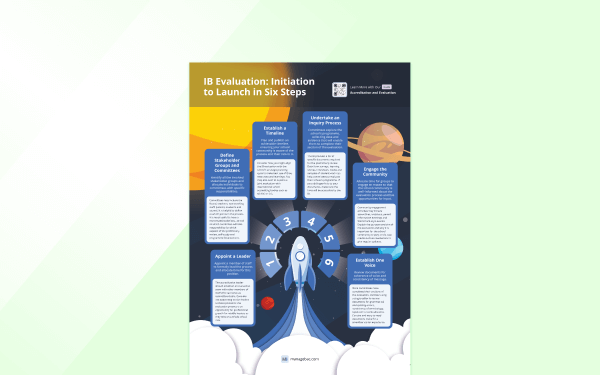
As dedicated practitioners of the Primary Years Programme (PYP), educators and coordinators play a vital role in shaping the educational experiences in the learning community. Having a firm understanding the Authorization and Evaluation process is essential to maintaining programme quality and ensuring a holistic approach to learning and teaching. While navigating this journey, consider the following insights, tips, and guidance, allowing you to engage in the process with confidence and enthusiasm.
Embrace the Purpose of Authorization and Ongoing Evaluation
At the heart of the PYP, Authorization and Evaluation serve to enhance the educational quality, foster continuous improvement, and align with the International Baccalaureate’s (IB’s) mission of developing knowledgeable, caring, and internationally-minded learners. Embrace this process as an opportunity for self-reflection and growth as it supports in the identification of areas for improvement and the celebration of strengths.
Navigating the Authorization and Evaluation Process
Both the Authorization and Evaluation processes involve multiple components, aimed to reflect on core elements of the PYP, such as the learner, learning and teaching and the learning community. These components include:
- A comprehensive self-study in which schools engage in honest reflection and discourse on the implementation and growth of the programme.
- The submission and review of school policies, curriculum, and assessment documents.
- A culminating site visit with representatives from the IB that includes both time in learning spaces and discussions with stakeholders from the learning community.
Engaging in the Authorization process signifies a school’s readiness to deliver the PYP effectively. Consider your collaboration with IB-recognized consultants who can offer fresh perspectives on aligning with the PYP Standards and Practices. It is important to remember that this journey is not about compliance with requirements, but embracing a philosophy and approach that benefits the growth of learners.
Upon Authorization, schools will regularly participate in the Evaluation process, which is intended to be an enriching experience. Embrace the support offered by the IB and welcome the evaluation team as partners on the journey of change and development. Early and often along the Authorization and Evaluation process, gather evidence of the school’s commitment to principles, practices and philosophy of the PYP. This evidence may be present in written policies, unit planners, examples of student work, and through anecdotal sharing.
- Inquiry based learning
- Transdisciplinary connections
- Conceptual understanding
- Collaboration amongst stakeholders
- Development of learner agency
Building Capacity for Ongoing Success
As schools engage in the collaborative process of Authorization and Evaluation, valuable analysis, revision, and shifts in teacher practice may emerge. Consider how the following experiences may occur regularly and become common practice:
- Cultivate a culture of reflection Practice and provide time for continuous refinement of learning and teaching practices. Embed a culture of reflection within the learning community by encouraging teachers and students to engage in meaningful feedback loops. Emphasize the significance of reflection in enhancing teaching practices and student learning outcomes.
- Empower students as inquiry-driven learners Central to the PYP is nurturing students as inquirers, thinkers and communicators. As students are empowered with the agency to take ownership of their learning journey, their questions can guide the exploration of concepts, leading to deeper conceptual understanding. Foster an environment where curiosity thrives and creativity blossoms.
- Support collaboration and professional development The PYP journey is a collective effort. Encourage regular collaborative planning sessions amongst teachers (including single-subject teachers), allowing for transdisciplinarity and the development of comprehensive learning experiences. Emphasize the importance of ongoing professional development to enrich teaching practices and stay informed about learning with the IB.
- Engage with the PYP community Connecting with the broader PYP community to gain inspiration and insights beyond the context of your school building. Participate in PYP workshops, conferences and online forums to interact with PYP educators and coordinators across the globe. These connections can offer valuable support and encourage a shared sense of purpose.
- Embrace challenges as opportunities
The Authorization and Evaluation process may present challenges, that is typical! Remember that challenges are opportunities for growth. Embrace challenges with a positive mindset, focusing on the potential for improvement and innovation. Congratulations on your dedication to nurturing young minds and providing a foundation for lifelong learning. The Authorization and Evaluation process is not merely a checklist; it is a pathway to enriching education and fostering a community of caring, internationally-minded learners. As you continue on this journey, embrace the process with enthusiasm. The PYP community is available to support schools along the way. Together with schools, the IB continues to elevate the standards of education and create a better world through a shared commitment to the Primary Years Programme.
About the Author
Erica Chiotti ManageBac PYP Subject Leader
With over 20 years of classroom teaching experience, educational coaching and mentoring, Erica is currently working with schools and teachers across the globe to implement best practices for PYP learning and teaching. She connects with teachers and leaders to provide individualized, on-going support that is grounded in the IB approaches to teaching. Outside of PYP work, Erica enjoys running, reading and all things sports. She loves spending time exploring and adventuring with her family in the Pacific Northwest.
The Learning Management Digest
Subscribe today to receive our latest resources, events, updates and so much more – specially curated for you, and delivered straight to your inbox.



